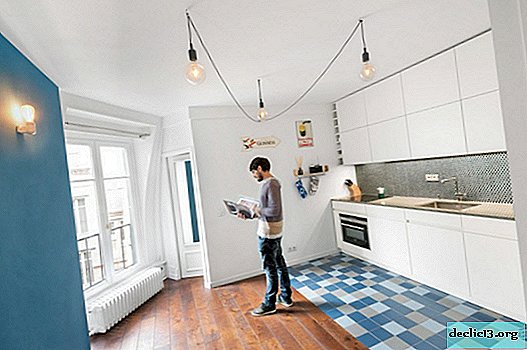How to learn to sit on the twine - video tutorials and exercises

People admire the flexibility of gymnasts and athletes. One gets the impression that these athletes do not have joints and bones, because they easily sit on the splits and do incredible tricks. After what he sees, he is interested in how to learn to sit on the twine at home.
The body of the athlete is designed in the same way as the ordinary person. Through training, he made stretching perfect, and good stretching is good for everyone. If you go to the gym or participate in group fitness training, you are probably faced with muscle clogging. Proper stretching helps to avoid such trouble. You can perform exercises and learn twine at home, if you set a goal and train flexibility.
Do you need a good stretch? The question is interesting. For a person who leads a sedentary life, a warm-up is enough, which involves a series of bends and sips. People who do gymnastics, martial arts, swimming, yoga or dancing cannot do without flexibility and stretching, and twine is an indicator of the elasticity of ligaments and muscles.
Twine is useful even to people who are not friends with professional sports. Feeling the flexibility of the body is nice. If you set out to master the twine, then you decided to challenge laziness and prove to others that nothing is impossible. I will help with useful tips.
Helpful information
Together with the ability to sit on a twine, stretching helps to cope with pain after physical exertion, reduces the risk of injury and accelerates the restoration of muscle tissue. Stretching will benefit both the expectant mother and the person who wants to make an impression.
The flexibility of the body prolongs youth, as it affects the regeneration and metabolic processes. But the ability to master the twine is an individual trait.
- Floor. There is an opinion that it is easier for a woman’s body to adapt to stresses, since the female body is more flexible. Male acrobats, wrestlers and gymnasts who sit on the splits prove that training, not gender, is the key to success.
- Age. In youth, it is easier to learn twine. A small child, thanks to movable joints and stretching ligaments, is able to learn to sit on a twine in a day. This does not mean that a thirty-year-old man will not cope with the task.
- Natural data. People have a different body constitution, and each species is stretched differently. It all depends on the parameters of the musculature and the characteristics of the skeleton, the length of the ligaments, the presence of elastin and collagen in the soft tissues. Even in children, the flexibility is different.
- Physical training. It’s more difficult for a person mastering twine from scratch to achieve a goal than an athlete with stretching skills. In addition, muscles and ligaments quickly lose elasticity. Even a short pause in training pushes success.
- Drinking and Nutrition. Thanks to a balanced diet, muscles get protein, which provides flexibility and recovery. It does not allow you to gain weight, which prevents the development of twine. More important is water. A person whose body does not have enough moisture will not be able to master the twine.
The ability to sit on the twine, as well as the speed of the process, depends on the consistency of training and discipline. To achieve the result, it is recommended to engage in half an hour daily. In this case, before training, the body must receive a power load.
Step-by-step video training
You can learn to sit on the twine even without additional exercises, paying attention to stretching. It is recommended to practice in the morning. In the morning, the body responds better to training. As a result, less effort is required to achieve the goal.
Basic stretching exercises
If you decide to make the stretch perfect, this goal is laudable. It brings a sense of pride, and the twine will endow with pleasant bonuses, including good coordination of movements, strong walls of blood vessels and muscle tone.
For this to happen, you will have to work hard, gradually mastering the twine. You can do this under the supervision of a coach or on your own. In any case, you will have to perform basic exercises focused on stretching training.
- Start your workout by warming up.. Unheated muscles do not stretch well. As a result, during the class breaks in the ligaments. After getting injured, the twine will have to be forgotten until the ligaments are restored. I recommend that you initially engage with an instructor, and after several classes go to independent training.
- Energetic swings with limbs, rotations, tilts of the body and head. The first ten minutes of the workout. Then switch to static and dynamic twine exercises. For beginners, I advise you to start with dynamic exercises that create less strain on the ligaments and joints.
- The appearance of sharp pain is the first sign of injury. If this happens, stop training and relax, and apply a little ice or a cold object to the point of pain. An exception is the pulling pain that accompanies an attempt to sit on the twine. She testifies that muscles work, stretch and become elastic.
- Exercise number 1. Sit on the floor and lay your straight legs in front of you. With your heels, focus on the floor, and point your socks up. Reach your feet to your feet, grab your fingers and pull towards you. Then try to lie on your knees with your stomach and chest, without bending your legs. Three approaches for half a minute is enough.
- Exercise number 2. Sit on the floor and spread your legs wide. Lean to both legs alternately. In the process of training the toe of the foot, pull on yourself without bending the knee. Do three repetitions on each leg, and between the approaches stretch to the center, trying to get as low as possible.
- Exercise number 3. Take a standing position, putting your legs as tight as possible to each other. Without bending your legs, bend your body and reach with your palms to the floor. First touch the floor with your fingertips, then increase the angle of inclination. At first, difficulties will arise with the retention of straight legs. I recommend hugging your knees, which will increase flexibility and boost muscles.
- Exercise number 4. Standing on one knee, straighten the other leg in front of you. Lean to a straightened leg and reach with your palms to the floor. Then gradually lower yourself, performing springing movements. This will help to gradually increase the load and control the sensations. After a few minutes, repeat the approach for the second leg.
- Exercise number 5. The exercise resembles the previous version, only put your supporting leg on your toe and straighten. Initially, this will not work, so try to straighten your hind leg to the maximum. With your hands resting on the floor, slowly lower your pelvis. Over time, master the longitudinal twine.
Cross twine is a more complicated trick requiring effort. Start mastering it after a perfect longitudinal stretch.
During the above exercises, evenly distribute the load on the legs, breathe deeply and without delay. It is easier to sit on the twine if the stretch is oriented to all muscle groups.
Video lessons
How quickly learn the twine depends on the parameters listed. Please note that even girls who have been involved in sports since childhood, but did not experience stretching, can’t quickly sit on the splits. Do not expect to get into the splits in a week or a month. Get ready for systematic and lengthy classes. As a result, after six months, the stretch will become ideal.
8 steps to perfect twine
Twine is an indicator of flexibility. It is used in gymnastics, martial arts and dancing. Some people easily bring stretching to perfection, while others have difficulties. Almost everyone can master the trick.
For training you will need the right equipment - light clothing made of natural material, a place for classes, a mat, perseverance and determination.
- Step 1. First, warm up your muscles with jumps, swings, inclines, and intense walking. The minimum warm-up time is 10 minutes. During this time, prepare your body for exercise.
- Step 2. Sit on the rug and stretch your legs, straighten your back, and with your hands reach the toes. Reaching for your fingers, hold on for half a minute and take a deep breath. Repeat fifteen times. Be sure to watch your back and do not slouch.
- Step 3. Sit with your left foot facing forward and your right foot at right angles to it. Taking a position is not easy, so at first help your feet with your hands. After a few minutes, swap your legs. Always maintain a straight back and right angle.
- Step 4. In the supine position, lift the legs at right angles to the body and, spreading apart, take a moment pause. After the leg, connect, lower to the floor and rest. During the first workout, repeat the exercise ten times. In the future, increase the number of repetitions, alternating with rest.
- Step 5. Take a standing position and in turn raise your legs as high as possible, keeping your back straight. Twenty mach is enough to start. Later, lifting the leg, fix at the end point for half a minute. Next, move your legs to the side with a delay.
- Step 6. Perform the next exercise while standing. First of all, make a quick lunge with one foot and after forming a right angle, make several swinging and crouching movements. Then change your leg. I recommend five minutes to complete the exercise.
- Step 7. In a standing position, lift one leg, bend at the knee and press it to the chest. Take your leg to the side and fix it. Then with the help of your hand, take your foot to the side, as far as possible. After changing the legs, repeat the exercise.
- Step 8. Having taken a standing position, throw your leg on the back of a chair, window sill or kitchen table. Further, carefully bending the leg, carry out body movements in the direction of the support on which the leg is located. After fifteen repetitions, change your leg.
Doing exercises, do not stretch the muscles until colorful circles appear in front of the eyes. Feel the measure, otherwise you risk injuring your muscles and joints, which will not allow the dream to come true.
Video tipsI recommend performing the listed exercises diligently and constantly, otherwise do not reach the goal. Stretch your muscles smoothly and slowly without sudden movements. Train relaxed muscles, otherwise waste your energy.
For several days after training, the body will hurt. This does not mean that you have to give up the dream. A bath or a hot bath will help relieve muscle pain, and listen to music while exercising.
If you cope with laziness and exercise daily, in a few days the pain will go away, your posture will straighten, and your gait will become easy.
In conclusion, let's talk about the age at which you can learn to sit on the twine. If you think that people with an ideal stretch have been engaged since childhood, you are mistaken. Practice shows that it is possible to master a trick at any age. It all depends on the approach to training.
It is easier to master the twine at the age of twelve than at the age of 50, but this does not mean that a person at the age of 50 cannot learn this. Enough to show zeal.

















